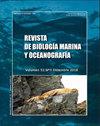热带金枪鱼:全球变暖与粮食安全,全球视野
IF 0.5
4区 生物学
Q4 MARINE & FRESHWATER BIOLOGY
引用次数: 5
摘要
西班牙语摘要:“热带金枪鱼”一词是指一组尾状目鱼类,包括鲈鱼或鲈鱼(Katsuwonus pelamis)、大眼金枪鱼(Thunnus obesus)和黄鳍金枪鱼(Thunnus albacares),它们具有广泛的泛热带分布,它们所居住的海水的最佳表面温度约为20摄氏度。目前,其中两个物种是全球登陆量最大的7个物种之一。预计未来热带金枪鱼库存将在保障粮食安全方面发挥关键作用。这项工作的目的是介绍渔业生物学在气候变化背景下管理热带金枪鱼种群方面面临的主要挑战。为此,回顾了迄今为止关于气候波动和全球变暖对热带金枪鱼种群影响的研究。“热带金枪鱼”一词是指分布广泛的短鳍金枪鱼(Katsuwonus pelamis)、大眼金枪鱼(Thunnus obesus)和黄鳍金枪鱼(Thunnus albacares)。热带金枪鱼栖息在海面温度在20°C左右的水域。目前,其中两个物种是世界上登陆人数最多的7个物种之一。此外,预计未来的热带金枪鱼库存将在保障粮食安全方面发挥关键作用。本文的目的是回顾关于气候振荡和全球变暖对热带金枪鱼种群影响的研究。此外,它还警告说,在气候变化的背景下,渔业生物学在管理重要渔业资源热带金枪鱼的库存方面面临的主要挑战。为此,对迄今为止关于气候振荡和全球变暖对热带金枪鱼种群影响的研究进行了审查。本文章由计算机程序翻译,如有差异,请以英文原文为准。
Túnidos tropicales: calentamiento global y seguridad alimentaria, una visión global
espanolResumen: El termino ‘tunido tropical’ se refiere a un grupo de especies de peces escombriformes que incluye al listado o barrilete (Katsuwonus pelamis), el patudo (Thunnus obesus) y el rabil (Thunnus albacares), que presentan una amplia distribucion pantropical, y cuyo optimo de temperatura superficial del agua del mar en el que habitan se situa en torno a los 20oC. Actualmente, dos de estas especies se encuentran entre las 7 especies con mayores volumenes de desembarque a nivel mundial. Se preve que en el futuro los stocks de tunidos tropicales jueguen un papel fundamental para salvaguardar la seguridad alimentaria. El objetivo de este trabajo fue presentar los principales retos de la biologia pesquera en relacion a la gestion de las poblaciones de tunidos tropicales en un contexto de cambio climatico. Para esto se revisaron los estudios que se han abordado hasta el presente sobre el efecto tanto de las oscilaciones climaticas, como del calentamiento global en las poblaciones de tunidos tropicales. EnglishAbstract: The term ‘tropical tuna’ refers to skipjack (Katsuwonus pelamis), bigeye (Thunnus obesus) and yellowfin tunas (Thunnus albacares), which have a wide pantropical distribution. Tropical tunas inhabit waters with a sea surface temperature with an optimal value around 20°C. Currently, two of these species are among the 7 species with higher landings worldwide. In addition, it is expected that future tropical tuna stocks play a key role safeguarding food security. The aim of this paper was to review the studies about the effect of both climatic oscillations and global warming on tropical tuna populations. Moreover, it warns about the main challenges of fisheries biology in relation to the management of stocks of tropical tunas, an important fishery resource, in the context of climate change. For this, a review of studies that have addressed to date the effect of both climate oscillations and global warming on populations of tropical tunas was performed.
求助全文
通过发布文献求助,成功后即可免费获取论文全文。
去求助
来源期刊
CiteScore
0.70
自引率
0.00%
发文量
41
审稿时长
12 months
期刊介绍:
Publicar desde una perspectiva científica, artículos originales, decididos por un proceso de revisión por pares, invitando a expertos de reconocido prestigio en el área. Los trabajos publicados se caracterizarán por su solidez teórica-metodológica, actualidad y relevancia para las ciencias marinas.
Se reciben trabajos inéditos derivados de la investigación científica realizada en ambientes marinos y estuarios, en formato de Revisión, Artículos, Notas Científicas, y Obituarios en las siguientes disciplinas::
Biología-Ecología marina
Oceanografía física, química y biológica
Contaminación marina
Geología marina
Sistemática, Faunística y Biogeografía Marina
Manejo Costero
Acuicultura marina
Pesquería marina.

 求助内容:
求助内容: 应助结果提醒方式:
应助结果提醒方式:


